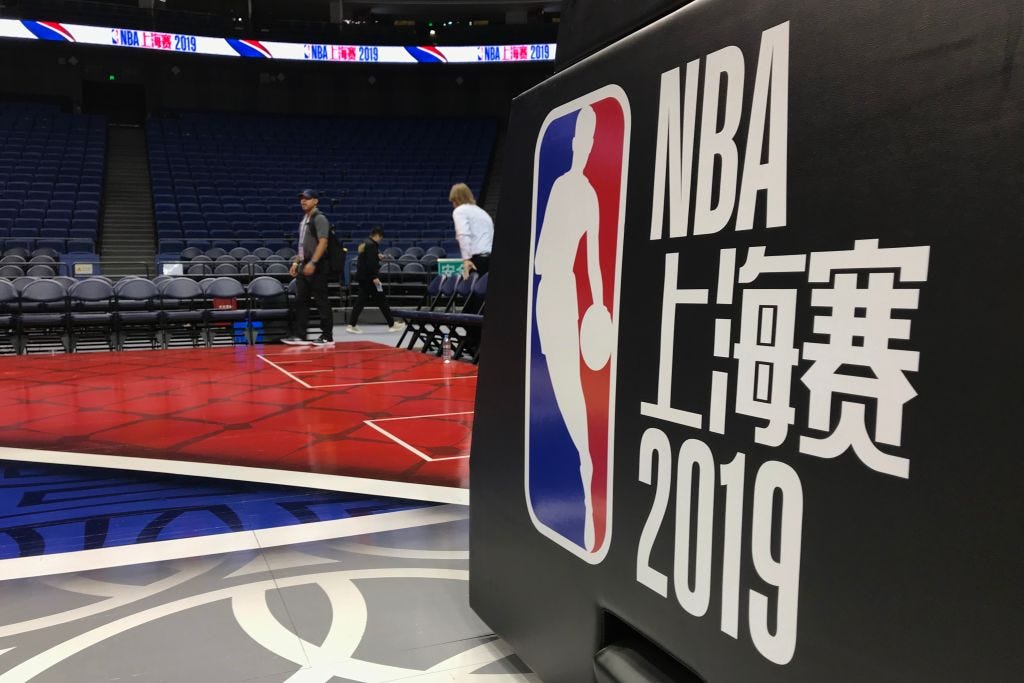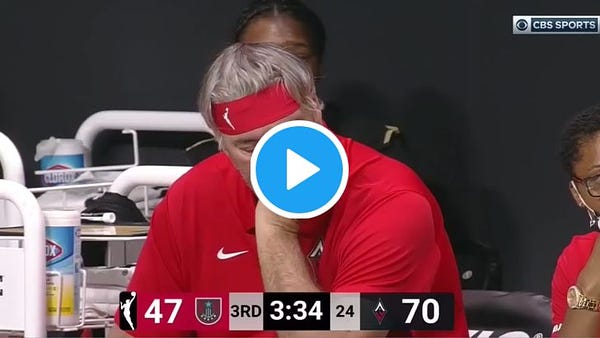This NBA China problem is not complicated
The league is reportedly overlooking abuse of teenagers at facilities with its name on it. That's inexcusable anywhere on the planet.
Good morning. The NBA is back. Let’s talk about something that should but will probably not overshadow whatever good feelings the NBA’s comeback generates.
First, a programming note: next week, all five issues of Good Morning It’s Basketball will be free to all. So if you’re on the free list and seeing this, you can look forward to daily issues next week as we get back into the swing. And if you’re a paying subscriber … folks, gear up for the next … uh, 24 months of NBA basketball (bubble-2020 free agency-2021 season-2021 free agency-Olympics, sheesh!). Thanks for sticking with me.

Getty Images Sport
The academies — one of which was located in the Xinjiang region, where the Chinese government reportedly has as many as a million ethnic Uighurs in detention camps — were supposed to help build basketball in China at the grassroots level, using NBA-adjacent coaches to develop top prospects who would also receive a holistic educational experience in the academies.
This is straight from an old NBA press release on the academies.
NBA Academies include educational development for top international male and female prospects and mark the NBA’s most significant investment in elite player development. The initiative will support existing international basketball academies by exposing elite prospects to NBA-level coaching, facilities and competition and by providing a global framework for elite-level prospects to maximize their success.
These academies will employ a holistic, 360-degree approach to player development extending beyond the court by focusing on education, leadership, character development and life skills. [...] Each elite training center will be staffed with NBA-trained coaches to foster the development of prospects on and off the court, both during and after their basketball careers. [...]
NBA Academies will also aim to foster the development of local basketball support staff.
Here’s what Fainaru and Fainaru-Wada reported:
American coaches at three NBA training academies in China told league officials their Chinese partners were physically abusing young players and failing to provide schooling, even though commissioner Adam Silver had said that education would be central to the program, according to multiple sources with direct knowledge of the complaints. [...]
The NBA brought in elite coaches and athletic trainers with experience in the G League and Division I basketball to work at the academies. One former coach described watching a Chinese coach fire a ball into a young player's face at point-blank range and then "kick him in the gut."
"Imagine you have a kid who's 13, 14 years old, and you've got a grown coach who is 40 years old hitting your kid," the coach said. "We're part of that. The NBA is part of that."
Deputy commissioner Mark Tatum is the only NBA executive quoted in the story. In short, he claims there wasn’t much the NBA could do given local control of the academies: “We did everything that we could, given the limited oversight we had.” He claims the NBA basically told the local coaches to cut out the abuse; the American coaches there reported mixed results in actually stopping the behavior.
There is something the NBA could have done, bearing witness to the abuse of teenage basketball prospects (both physical and in the lack of education): the league could have pulled out of the academies.
It has recently come to light that the NBA did pull out of the Xinjiang academy in 2019, though there is some reporting in this piece that disputes just how clean that exit was. Tatum says the academy was “unsalvageable” due to issues with the local coaches. That the NBA made no announcement it had left Xinjiang in 2019 and only revealed that information in a terse response to questions from a U.S. Senator is telling: despite bristling at the arrangement in at least one of the three NBA academies in China, the NBA desperately wants to avoid looking as though it was criticizing the Chinese government. The blame is laid at the feet of the local coaches. The atrocities being committed in Xinjiang are considered beside the point — here’s Tatum’s only reference to the plight of the Uighurs:
"My job, our job is not to take a position on every single human rights violation, and I'm not an expert in every human rights situation or violation," Tatum said.
When you do business with those violating human rights, it’s your business.
Fainaru and Fainaru-Wada report the physical abuse by coaches and lack of educational focus at the other two NBA China academies as well. Those academies remain open.
This academy scandal is not complicated.
Imagine for a second that this was happening in the United States or Canada. That the NBA partnered with a state or provincial government to assist at a local basketball academy, putting its imprimateur on it. And imagine kids at that facility being hit and kicked by local coaches, being denied a proper education, being stacked up eight kids due a two-person room. It would be an enormous black eye — a terrible scandal — that the NBA would be associated with it. That the academies are in China instead of Connecticut shouldn’t change that.
The NBA says it has “limited oversight” over how the academies are run by local officials. Abuse by local officials was reported to the NBA. And the NBA is still there. This is not complicated by the immense revenues the NBA seeks to continue to pull from Chinese businesses and fans. This is not complicated by the Chinese government’s ability to impact the NBA’s bottom line by pull games off of state television and Chinese streaming services. This is not complicated by cultural differences in athletic coaching. This is not complicated by the NBA’s social justice positions in America, or by the fact that certain political actors are leveraging these issues in bad faith attacks on the NBA from the American right. (I consider those attacks to be made in bad faith because the political actors are clearly not seeking to change the NBA’s business practices with regards to China, but to undercut the NBA’s messaging on social justice in America, of which this political actors are avowed opponents.) This is not complicated by the American president’s baffling foreign policy. Abuse is abuse. If you know about abuse and do effectively nothing, you are complicit in the abuse.
The NBA has been aware of abuses occurring at youth academies that bear its name. The NBA acknowledges it has limited ability to protect the kids. And the NBA is still in two of those three academies. That’s not complicated, folks. That’s a choice the NBA is making. A very, very bad choice and a stain on the league.
Sabrina
Holy smokes, Sabrina Ionescu.
Second game of her WNBA career. She’s real.
WNBA Scores
Mercury 100, Fever 106 — When do we start worrying about Phoenix?
Liberty 80, Wings 93 — Sabrina is rightfully getting all of the attention. Her college teammate Satou Sabally got the W, though.
Dream 70, Aces 100 — A’ja Wilson gunning for Wubble MVP early on. I’m not so sure about Bill Laimbeer’s Wubble look, though.
Schedule
An NBA bubble double-header on TNT! The games actually count in the standings! This is actually a huge game tonight for New Orleans — there’s not much room for error until we see how Portland looks since the Blazers due have the standings advantage.
Jazz vs. Pelicans, 6:30 p.m. ET
Clippers vs. Lakers, 9 p.m. ET
The WNBA has its usual three games as well, including the reigning champs vs. the next champs.
Storm vs. Mystics, 6 p.m. ET, ESPN
Sky vs. Lynx, 8 p.m. ET, NBA TV
Sun vs. Sparks, 10 p.m. ET, ESPN
Links
A woman alleges in a Sports Illustrated piece that she was assaulted by a top Mavericks executive during Summer League, and that the team exonerated him without seeing all of the evidence. The Mavericks claim that the alleged victim would not provide the evidence directly to the franchise and implies she was looking for a pay-out.
Michael Lee in The Athletic on the commitment WNBA and NBA players made to Breonna Taylor’s family. ($)
Josh Robbins in The Athletic on two NBA employees making sure the daily delgue of packages for players and staff are handled efficiently. ($)
Mike Conley explains choosing “I Am a Man” for his jersey message.
In the Washington Post Ben Golliver talks to Rudy Gobert about his isolation and emotional state given the blame he took on when the NBA shut down in March. ($)
John Hollinger’s bold predictions for the bubble in The Athletic. ($)
More Kelly Dwyer on bubble teams. ($)
Two fascinating non-basketball stories: Richard Johnson on what we do and don’t know about the football play that killed the legendary Jack Trice and John Gonzalez on Milorad Cavic, who lost the 100m butterfly to Michael Phelps in the 2008 Olympics by 0.01 seconds and had his life defined by it.
Be excellent to each other.





greed and shame are powerful